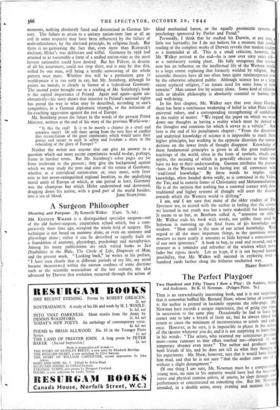A Surgeon Philosopher
Meaning and Purpose. .By Kenneth Walker. (Cape. 7s. 6d.) MR. KENNETH WALKER is a distinguished specialist surgeon—not of the old barber-surgeon, amputation school which, but a com- paratively short time ago, occupied the whole field of surgery. His technique is not based on anatomy alone, or even on anatomy and physiology alone ; rather it can be described as equally built on a foundation of anatomy, physiology, psychology and metaphysics. Among his many publications are such varied books as Sex Disabilities in the Male, The Circle of Life, Diagnosis of Man, and the present work. " Looking back," he writes in his preface, " I have seen clearly that at different periods of my life, my mind became incarcerated within the narrow confines of some doctrine such as the scientific materialism of the last century, the idea advanced by Darwin that evolution occurred through the action of
blind mechanical forces, or the equally pessimistic systems of psychology sponsored by Pavlov and Freud." .
Personally, I think that he studied his Darwin, at any rate, a little too hurriedly; for I do not believe for a moment that careful reading of the complete works of Darwin reveals that modest student as a materialist at all. This is a small criticism, however, for Mr. Walker arrived at the end—he is now over sixty years old— at a satisfactory resting place. He fully recognises that science now has an influence on the intellectual life of the Western world, to a large extent replacing that formerly wielded by religion. But scientific theories have all too often been quite misinterpreted even by the otherwise educated public. Although science has to a large extent replaced religion, ." an innate need for some form of faith remains." Man cannot live by science alone. Some.kind of religious faith or idealist philosophy is absolutely essential to human life and well-being.
In his first chapter, Mr. Walker says that ever since Goethe, there has been a continuous weakening of belief in what Plato called universal values, and a corresponding strengthening of confidence in the reality of matter. "We regard the paper on which we write down our thoughts as having a reality which must be denied to the. thoughts and emotions for which it serves as a vehicle." And here is the end of his penultimate chapter : " From the discursive and analytical knowledge of science it is impossible • to reach these higher principles, but working in the opposite direction the contra- dictions on the lower levels of thought disappear. Knowledge of these fundamental principles is given in all the great traditional teachings of the world, often in the form of symbols, rituals and myths, the meaning of which is generally obscure to those who have no key to their understanding. Guenon attributes the present chaos in the Western world to its having lost all connexion with • traditional knowledge.' By these words he implies such knowledge, often handed down orally, as is contained in the Vedas, the Tao, and in esoteric forms of Christianity and Mohammedanism. He is of the opinion that nothing but a renewed contact with these traditional and higher systems of thought will avert the disaster .towards which the Western world is drifting."
I am, and I am sure. that many of the older readers of The Spectator are, in accord with the author in feeling that the science we learned in our youth was but a sorry makeshift for knowledge. It seems to us but, as Bentham called it, " nonsense on sults." r- Mr. Walker ends his book with words, not unlike those used by Solomon in summing up the final fruits of Otis knowledge and wisdom. "How small is the sum of our actual knowledge. With regard to all the more important things, to' the questions which ctncem us most nearly it amounts to little beyond a consciousness of our own ignorance." A book to buy, to read and re-read, and to treasure as a reminder and refresher of the wisdom which never fades but ripens slowly. Let us hope, if it is not beyond human possibility, that Mr. Walker will succeed in exploring even a hundred yards farther along the hitherto uncharted way.
HARRY ROBERTS.


























 Previous page
Previous page